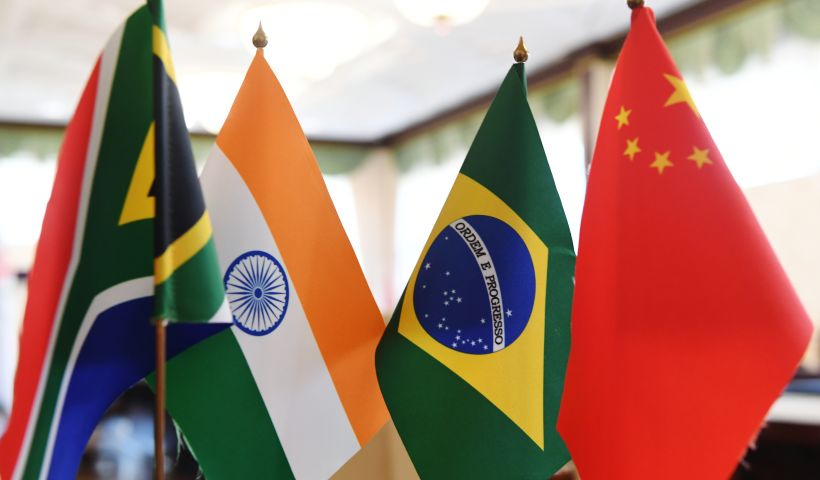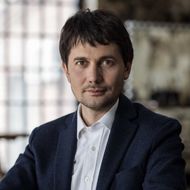Alexey Ivanov: BRICS Countries Can Play a Key Role in Forming a New Complex Approach to Regulation of Digital Ecosystems

Experts from the HSE BRICS Competition Law & Policy Centre presented a natural approach-based concept for antirust regulation of digital ecosystems at the 7th BRICS International Competition Conference, which took place from 16th to 17th November 2021 in China.
The BRICS International Competition Conference is world’s biggest event on BRICS competition policy. The first conference was held in Kazan in 2009 at the initiative of FAS Russia, and since then, it has been held in different BRICS countries biannually. In 2019, the conference was hosted by Moscow. In 2021, the organizer of the conference was China’s antitrust authority – the State Administration for Market Regulation.
Today, regulators worldwide are trying to fight the problem of the growing market authority of big digital corporations and platforms. But this work is often fragmented and lacks an overall system. ‘Regulatory approaches of the industrial era have collided with a new economic and social phenomenon, which is ecosystems. It’s time to discuss a new integral understanding of antitrust regulation’, explained Alexey Ivanov, Director of the HSE International BRICS Competition Law and Policy Centre and Director of the HSE — Skolkovo Institute for Law and Development. He participated in the panel discussion ‘Development of Competition Policy in the Digital Era’.
Digital platforms and the digital ecosystems that are based on them — supplier and consumer networks forming around one centre — have already taken a key position in the digital economy and are an ‘entrance point’ for suppliers and consumers of goods and services. According to McKinsey, up to $60 trillion, or 30% of all global net sales will be transferred via these ecosystems in 2025. ‘Today’s competition laws need a comprehensive set of methods to evaluate how ecosystems work, how they compete with each other, how internal competition in an ecosystem works, and what opportunities there are for balancing them, without causing their destruction’, Alexey Ivanov explained.

Alexey Ivanov
A complex approach to ecosystem analysis and regulation suggested by the International BRICS Competition Law and Policy Centre uses similarities between natural and digital ecosystems and elaborates regulatory solutions based on an ecological approach to competition. Creators of ecosystems have already faced such a task and successfully solved it. Alexey Ivanov said that the new methodology of antitrust regulation should be inspired by the same principles and views as the business strategies of today’s big digital corporations, ‘which means the principles of wild nature’.
Digital competition models are being developed by the International BRICS Competition Law and Policy Centre together with the International Institute for Applied Systems Analysis (IIASA). They have already adapted the Lotka-Volterra interspecies competition model. This describes a situation when one or two competitors fight for the same resource. When applied to digital ecosystems, this resource is the users’ time and attention.
Ecosystems follow cycles, and for a business, it is essential to understand what stage of a cycle they are currently at, in order to take the next correct steps: this is a fundamental characteristic that defines a business strategy. But, as Alexey Ivanov said, currently, antitrust regulators continue to work as a mechanism, as an industrial machine: this ignores the cycles and living nature of a business. It is necessary to move to a more consistent model of ecosystems’ antitrust regulation, which would take into account their complexity, the large number of internal connections and their dynamic nature.
Alexey Ivanov believes that BRICS countries can play a very important role in designing a new complex approach to digital ecosystem regulation, which would rely on ‘nature-like solutions’: ‘This complies with the cultural traditions of our countries and, most importantly, can become a useful and effective solution for the problem of the growing disbalance of expanding and complexifying ecosystems across the globe; essentially, it could become a new standard for antitrust regulation in a digital economy’.
As he spoke at the session on competition policy coordination, Mr. Ivanov emphasized the special role of BRICS for developing competition at the global level: ‘The world is lacking an integral antitrust regulation regime today, but hopefully, a transitional scenario could be implemented by BRICS countries’. BRICS is a flexible format, which means that cooperation frameworks can also be flexible within it. Antitrust law is an adaptive regulation tool, which effectively reacts to rapidly-changing conditions. ‘We have an opportunity to elaborate an effective mechanism to coordinate approaches to competition protection through the effort of BRICS countries’, Alexey Ivanov said.
A special session of the conference was dedicated to the problem of cross-border cartels. Anna Pozdnyakova, Research Fellow of the International BRICS Competition Law and Policy Centre, presented the Centre’s outcomes in this research field.

Anna Pozdnyakova
The fight against cross-border cartels is the focus of attention of many international associations today (UNCTAD, OECD, International Competition Network), and BRICS countries agree that it should be strengthened. The International BRICS Competition Law and Policy Centre provides comprehensive support for competition authorities in developing tools to fight this type of anti-competition behaviour, including work as part of the UNCTAD Working Group on Cross-Border Cartels.
‘We have introduced the expert community to the second version of our empirical study on the experience of fighting cross-border cartels, which over 50 competition authorities participated in. This study includes conclusions on the obstacles and difficulties faced by law enforcement authorities in global cartel investigations. We hope that this study will be useful in international decision making’, said Anna Pozdnyakova.

Maxim Shaskolsky, Head of the FAS Russia, at the conference opening ceremony
‘The International BRICS Competition Law and Policy Centre provides essential expert support for the activities of BRICS competition authorities. In 2020, the Centre’s activities were praised by BRICS country leaders, which means that such a partnership is promising. It is important to use the Centre’s capabilities more actively and attract experts for the joint development of advanced solutions for the improvement of antitrust regulation in BRICS countries’.
See also:
‘Cities Are Key Actors of Interaction in the Global Arena’
The HSE Faculty of Urban and Regional Development (FURD) and India’s leading research centre, the Observer Research Foundation (ORF), have agreed to strengthen their partnership comprehensively in the study and analysis of urban development across BRICS countries. In addition, students and experts from Russia and India will take part in joint academic events and research projects.
HSE University Holds HSE CS × BRICS Ideathon
On November 9, 2025, the HSE CS × BRICS Ideathon—a large-scale intensive event for students aimed at developing international project skills and finding solutions to current challenges facing BRICS countries—took place at HSE University’s Pokrovsky Bulvar campus. The event was organised by the Multilateral Strategic Projects Office with the support of the BRICS Expert Council–Russia , the Faculty of Computer Science (FCS), and the HSE FCS Hackathon Club
‘To Help Make the World More Sustainable, Fair, and Humane’
The BRICS International School: New Generation has concluded at HSE University, bringing together more than 100 participants from 38 BRICS and Global South countries. The attendees included early-career researchers, diplomats, entrepreneurs, journalists, and civil society representatives.
‘Regulators Must Understand That Absolute Predictability is Unattainable’
On October 10–11, 2025, the BRICS Competition Law and Policy Centre at HSE University (the BRICS Centre) hosted a two-day international seminar, ‘Platform Economy: Competition Law and the Market Power of Digital Platforms,’ in Tashkent, Uzbekistan. The event brought together competition authorities from BRICS+ nations and leading antitrust experts from around the world.
Achieving Financial Independence: Experts Discuss Development of BRICS National Currency Settlements
How can BRICS countries move away from the dollar in international settlements, and what can they do to advance this goal today? These questions were discussed by experts during a round table at HSE University. The event was organised by the Multilateral Strategic Projects Office together with the HSE Faculty of World Economy and International Affairs as part of HSE’s activities within the BRICS Network University and the Joint Basic Research Projects ‘International Academic Cooperation of HSE University.’
Experts from HSE University and BRICS Anti-Monopoly Authorities Analyse Global Grain Market
The International BRICS Competition Law and Policy Centre at HSE University presented the scientific report ‘From Fields to Futures: Competition, Financialisation, and Digitalisation in Global Grain Value Chains.’ The document was prepared as part of expert support from the BRICS Working Group on Competition Research in Food Markets. The presentation took place at the academic conference ‘Emerging Challenges of Competition Law and Policy in the BRICS and Beyond’ on September 12, 2025, in Cape Town (South Africa), which the BRICS Centre organised together with the University of Cape Town on the sidelines of the 9th BRICS International Competition Conference.
HSE Launches Training for Future BRICS Experts
From August 20–23, 2025, the Artek International Children’s Centre (Crimea, Russia) hosted an off-site session of HSE University’s educational and outreach project BRICS International School: New Generation. The school was the first event to take place under the cooperation agreement signed this year between HSE University and Artek.
HSE University and University of Campinas Join Forces to Build Alternative Financial System
HSE University and the University of Campinas (UNICAMP, Brazil) have announced the launch of a major joint research project to develop new approaches to an alternative international financial system. The initiative, which brings together leading experts in global economics and finance, seeks to analyse the current state of international financial architecture and explore ways of transforming it in the context of a changing geopolitical landscape.
HSE University to Host BRICS International School: New Generation
Registration for the BRICS International School: New Generation, one of the leading international educational projects aimed at prospective leaders interested in the agenda of global development and cooperation within the framework of BRICS, has opened.
Experts Assess How BRICS Countries’ Education Systems Are Evolving
The BRICS Expert Council–Russia, based at HSE University and operating in collaboration with the HSE Institute of Education, has released an analytical report titled ‘The Transformation of General Education in BRICS Countries.’ The study explores how BRICS nations are addressing shared challenges, including equitable access to schooling, digital integration, support for inclusion, linguistic diversity, and intercultural dialogue.


